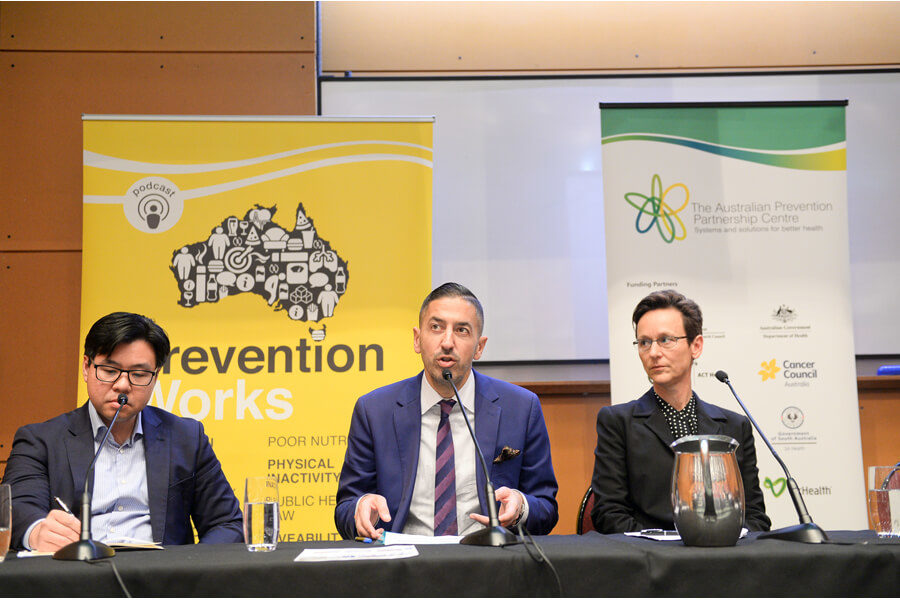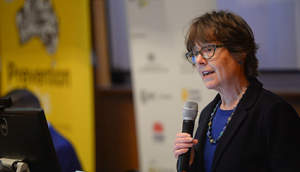Hate gives license to the ‘worst angels’ of human nature

DATE
TYPE Prevention Centre News
The Prevention Centre hosted world-leader in research on public health, Professor Sandro Galea from Boston University, for a series of events and meetings in Sydney and Melbourne.
At a symposium exploring ‘Hate as a public health issue’ held at the University of Sydney on 30 September, Professor Galea was joined by leading experts Professor Katharine Gelber, University of Queensland, whose works include Free Speech in the Digital Age, and Professor Tim Soutphommasane, University of Sydney, and former Race Discrimination Commissioner for Australia.

The event was chaired by Professor Penny Hawe, University of Sydney, and one of the Prevention Centre’s Lead Investigators. The panel explored the under-representation of hate in all its forms as a contributing factor in health and health equity.
“The most straightforward definition of hate is from the dictionary; hate is an intense or passionate dislike of someone. I like this because it goes back to decades of academic intellectual tradition about hate being a force that causes ‘othering’, that causes stigmatising and marginalising of groups and this dislike results in particular groups being singled out for adverse action and discrimination,” said Professor Galea.
His research shows that hate is a contributor to poor physical and mental health at both the level of the individual and at the societal level and should be positioned at the centre of discussions on public health.
“People who feel hated are more likely to experience major depression, and the fruits of hate – prejudice, discrimination, segregation, and interpersonal antagonism – sicken and kill Americans every day,” said Professor Galea.
How is hate a public health issue? How do we reconcile an emerging understanding of something as abstract as hate, how do we deal with something which ultimately affects the health of populations, and how we can observe hate within a fairly conventional public health framework?
“It becomes inevitable that if we care about the health of populations and we understand the consequences, it becomes the job of the public health thinker and doer to tackle hate as an issue.
“I think it is important that our conversations on this topic are open. And when you start thinking about it in a structured way, I think it becomes obvious that you have to consider it as a public health issue, which then of course, begs the question as to why we have not thought of it that way before,” said Professor Galea.

Professor Gelber, whose work has focused on free speech, talked about hate as a language embedded in our societal and legal systems as well as its intractability.
“So, what is hate speech? It’s a discursive expression, a discursive mechanism, it’s a way of using your words to discriminate against somebody. And the context is absolutely vital. You need people to use their words in a particular context – where those words can harm. So, hate speech is a type of systemically discriminatory harm.
“Hate speech is a type of discrimination, just like the denying somebody a house or denying somebody a job on the basis of their race, we recognise that those things are wrong,” said Professor Gelber.
“It simply means that we’re dealing with populations, millions and millions of people, and we have a responsibility to collectively encourage the better angels of our nature, and I worry that hate and hate speech in public gives license to the worst angels of our nature,” said Professor Galea
The panel argued that the first step in recognising the power of hate is to change the way we talk about health at a grassroots level as well as a policy level. Seeing health for what it is – a result of factors embedded in everyday life – is just as important as investing in a new hospital or MRI machine, and recognising the social implications on inequity.
“There are the economic harms that can come from expressions of hate, the denial of work, jobs, opportunities. And perhaps one aspect of hate that isn’t always recognised is the civic dimensions of harm. If you are a part of a group that is hated by sections of society, you may live with an inhibited sense of self, individually or collectively, you may not speak out,” said Professor Soutphommasane.
“I want to leave you with the knowledge that if we take the right steps, and we understand what hate is, we can change the rules of hate speech so that things become unacceptable to say, instead of being acceptable,” said Professor Gelber.
“What I’m trying to do is to give us a very, very simple framework, that we recognise in public health, and see how it applies equally well to hate. And as a result, it makes it part of our obligation to deal with it,” said Professor Galea.

The importance of recognising hate as a public health issue is a growing area of research which the panel recognises; their intention with this forum was to bring the topic to the forefront, opening up the conversation to a wider audience, one which will eventually impact public health policy. But how do we factor this into the discussion? How do we specifically talk about the public health framework and approach hate as public health professionals?
“I’m struck by how interesting and how jagged our exploration of hate and public health is. The conversation feels like as a collective our thoughts are unformed but that we’re really interested in making sense of this topic.
“I feel that we’ve arrived at some place to smooth out the jagged edges, that we’re learning from each other and shaping what the contours of our landscape should be, which suggests to me how early it is in introducing hate and public health concepts,” said Professor Galea.
“Chronic disease prevention is not only about things that might first come to mind like physical activity, alcohol intake, or tobacco use,” said Professor Hawe. “We need to understand how life is lived and address the issues that push some groups to society’s margins. That’s part of our mandate in prevention. Without it, we’re just skimming the surface.”
Media coverage
- ABC The Drum with Ellen Fanning, 30 September 2019: Treating hate as a public health issue
- ABC RN Late Night Live with Phillip Adams, 30 September 2019: Public health, illness and an unjust society
- MJA Insight, 30 September 2019: Time to invest in health, not just health care
- ABC RN Breakfast with Geraldine Doogue, 2 October 2019: Is hate speech a public health issue?



